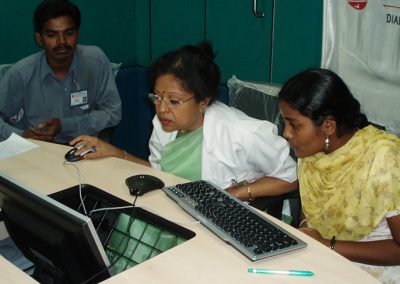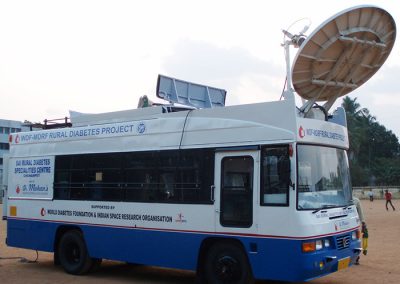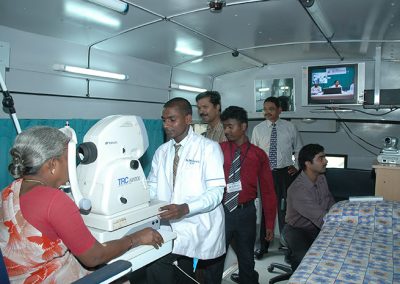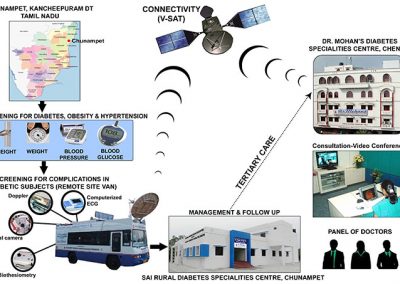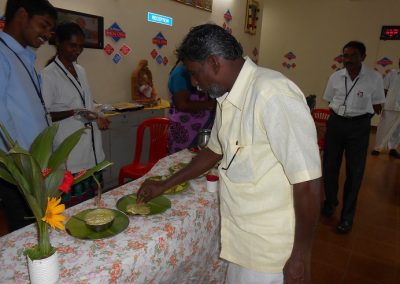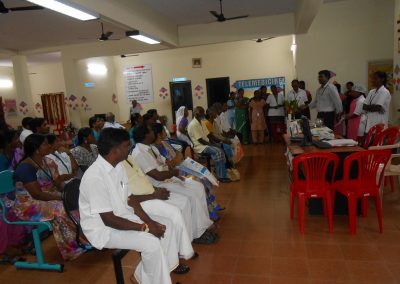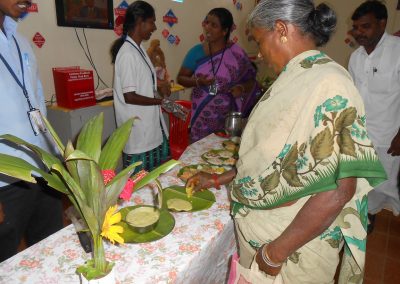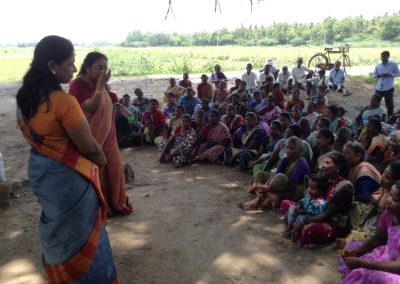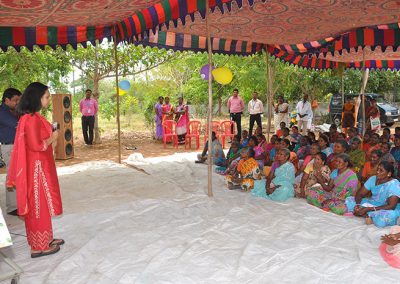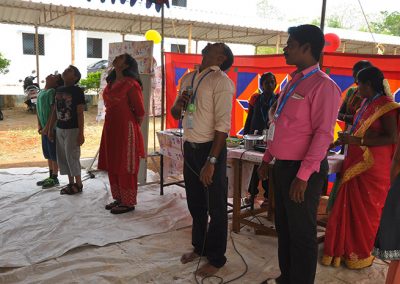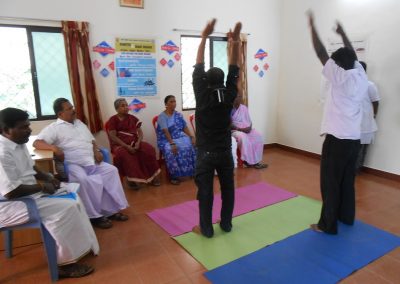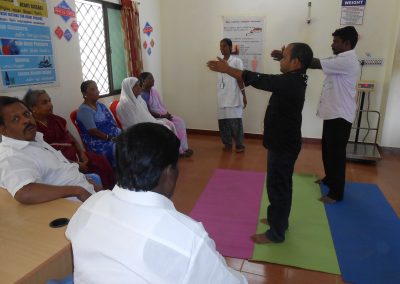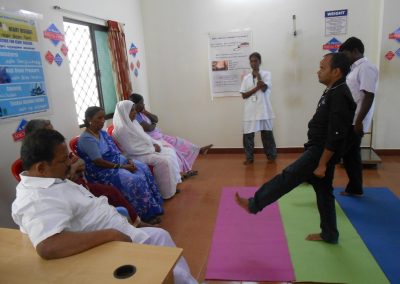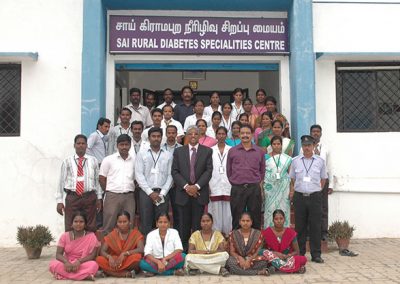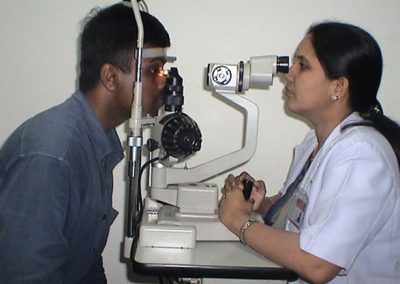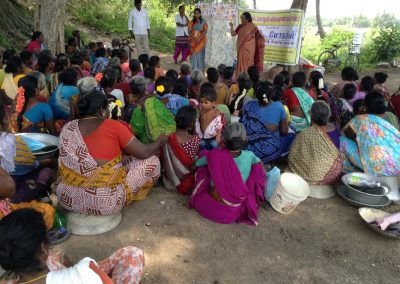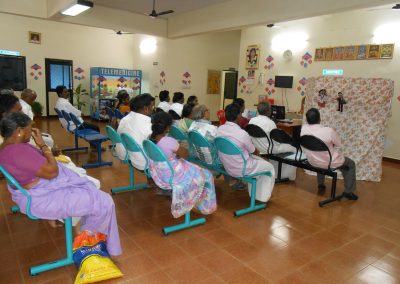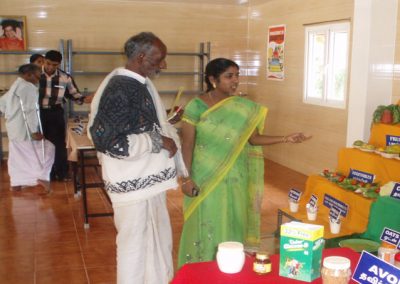RURAL OUTREACH
- Home
- Rural Outreach
RURAL OUTREACH
Rural Diabetes Care
The epidemic of diabetes in India affects not only the urban areas but also the rural areas. Most efforts on preventing and treating diabetes in India are focused on urban areas and there is virtually no ongoing diabetes prevention or awareness activity in rural areas. Thus we implemented the ‘Chunampet Rural Diabetes Project’ to take diabetes prevention and health care activities to rural India to improve the lives of millions of people affected with diabetes for whom diabetes care is presently not available, accessible or affordable.
The Chunampet Rural Diabetes Prevention Project Model
The Chunampet Rural Diabetes Prevention Project (CRDPP) was established in March 2006 with the aim of implementing preventive and therapeutic diabetes services by empowering local people. It is a rural community outreach program undertaken in a cluster of 42 villages in and around Chunampet in the Chithamur block in the Kancheepuram district of Tamil Nadu state in southern India, with an adult population of 43,158.
The objectives of the project:
- To implement prevention of diabetes at three levels i.e. primary prevention (prevention of diabetes itself), secondary prevention (prevention of diabetes complications by good diabetes control) and tertiary prevention (prevention of end stage complications and providing rehabilitation measures) in a rural area in Tamil Nadu as a model for prevention of diabetes in rural India and other developing countries.
- To encourage community participation by empowering the local people especially women and youth to become educators and spokespersons to adopt a healthy lifestyle and thereby play a significant role in preventing diabetes in the family and in the community at large.
- To screen for diabetes (self reported plus the newly detected) and ‘pre-diabetes’
- To screen for diabetic complications in individuals with diabetes with particular reference to eye, foot, kidney and heart complications using telemedicine as a novel tool.
Telemedicine Services and Screening for Complications of Diabetes
One of the major problems faced by the rural population is the lack of facilities in rural areas for both the screening and treatment of diabetes complications. This means that patients have to travel long distances to the nearest city for these services, leading to loss of income, as many of these individuals are daily wage earners. We therefore introduced a telemedicine facility for screening of diabetes and its complications and to provide preventive and therapeutic diabetes care to the rural population in collaboration with the World Diabetes Foundation, Denmark and the Indian Space Research Organization (ISRO) in Bangalore, India, through the Chunampet Rural Diabetes Prevention Project (CRDPP). A fully equipped mobile telemedicine van fitted with all equipment necessary to screen for diabetes and its complications was made available as part of this project. Use of a mobile unit with appropriate equipment, trained technicians, and satellite technology helped us ensure increased accessibility to diabetes health services in these rural areas.
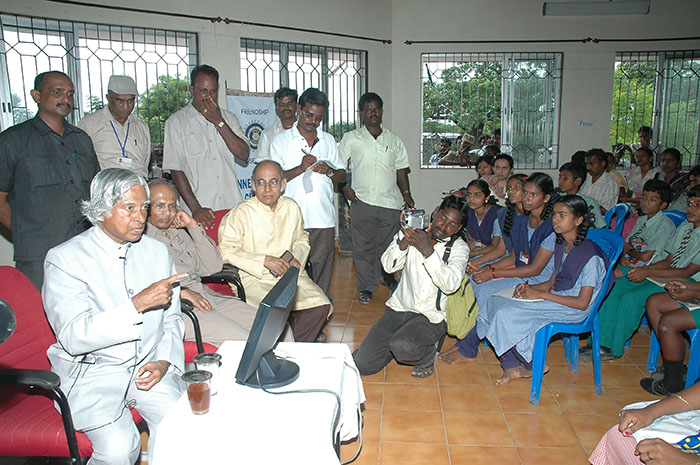
The then President, His Excellency Abdul Kalaam appreciated the initiative and called
it the model rural empowerment program .
Rural Diabetes Awareness and Educational Programs
Diabetes prevention education was provided in the form of mass- scale diabetes awareness programs. Self-help groups were trained in the preparation of low-cost recipes for balanced nutrition using locally sourced food including fruits and vegetables. Information, education and communication materials were also distributed regarding adopting a healthy lifestyle by increasing physical activity, avoiding tobacco, smoking cessation, reducing weight where appropriate, continuing the traditional diet pattern, and cultivating healthier crops. In keeping with local traditions, puppet shows, skits on diabetes, awareness programs for teachers, and diet exhibitions on healthy nutrition for school children and pregnant women were presented. On occasions such as World Diabetes Day, walks for children and special programs on healthy living were organized. Finally, farmers and housewives were taught to grow nutritious vegetables.
Rural – Life Style Modification
The slow spread of the diabetes epidemic to the rural population of India has been due to the changes in food consumption and decrease in physical activity of the people. While the urban population is bombarded with the messaging about the ill effects of obesity and the methods of controlling weight gain, the rural population has lesser exposure to such information. We, at Dr Mohan’s keep conducting mass awareness programs on healthy diet choices and simple exercise techniques that can be followed by one and all. Lifestyle modification education is imparted by group discussions and group activities. Reiterating the need for maintaining one’s BMI through diet control and exercise, regular reminders are given with rewards for those who achieve their health goals. Regular education classes are conducted for yoga, aerobic activities and endurance training.
Rural Diabetes Specialities Centre
In order to make diabetes health care available, accessible and affordable to rural people, the “Rural Diabetes Specialities Centre” has been set up at Chunampet village.
Village Adoption Program
To address the mismatch between the need for and availability of diabetes health care in the rural areas,we adopted 25 villages in Kanchipuram District for providing free diabetes care to the elderly and the young. Anyone > 65 years and or less than age of 10 years of age can avail free blood test and consultation at the rural unit of Rural Diabetes Specialities Centre at Chunampet. All patients with type 1 patients in these villages have been supported with free insulin. This is to ensure that good quality diabetes care is available and accessible to these people.
The success of the program has been published in LANCET, World’s leading journal on scientific publications.
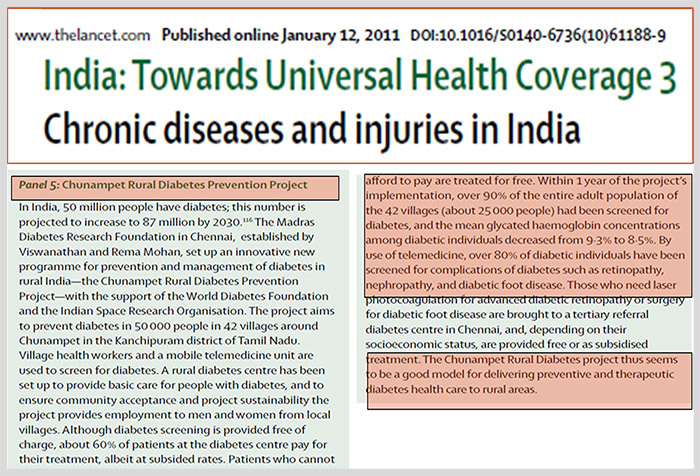
THE LANCET

Various international media coverage regarding rural outreach program in diabetes

